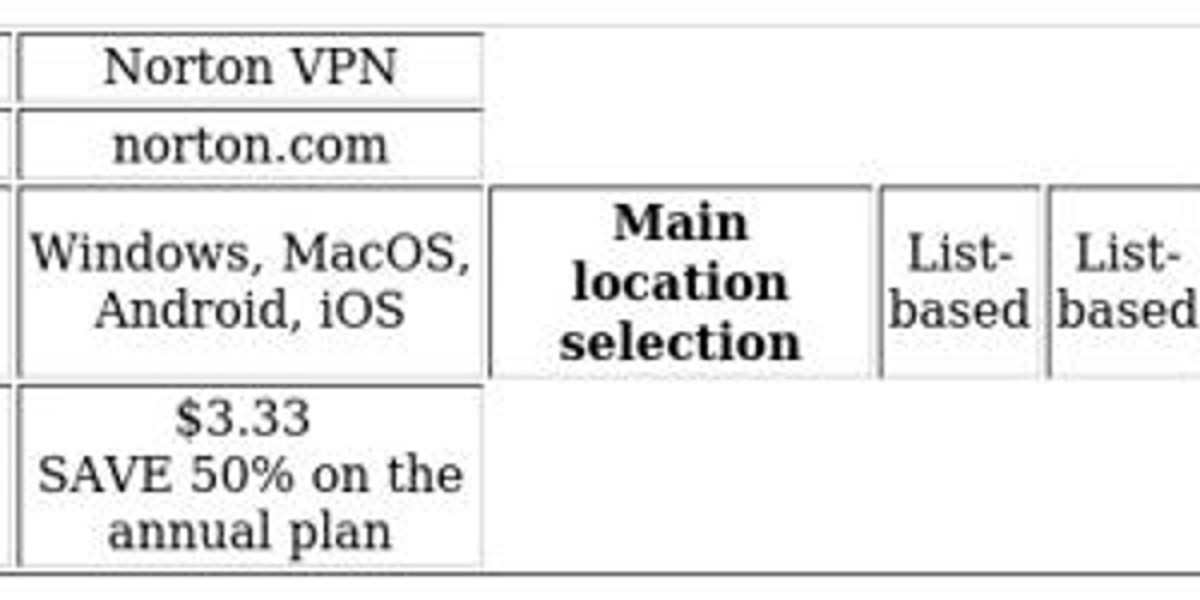VPN Comparison Overview
Navigating the world of VPN providers can be daunting, especially for newcomers.
With numerous options available, it’s easy to feel overwhelmed by the technical jargon and varying privacy features.
To complicate matters, some VPN services may exaggerate their offerings, leading to the risk of selecting an insecure VPN or one that fails to deliver good value.
At Comparitech, we employ a thorough VPN testing framework to evaluate and compare top VPN services.
In this analysis, we specifically examined Norton Secure VPN and Hotspot Shield across 11 critical factors.
By the conclusion of our comparison, you'll have a clearer understanding of which VPN boasts superior reliability, user-friendliness, speed, and streaming capabilities.
Previously, Hotspot Shield was pitted against Avast SecureLine VPN , emerging victorious.
Continue reading to discover if Hotspot Shield can triumph over Norton Secure VPN as well!
When evaluating the pricing of Norton Secure VPN and Hotspot Shield, both options present comparable costs, yet Norton introduces some complexity with its device subscription options. Norton allows users to select plans for 1, 5, or 10 devices, whereas Hotspot Shield offers a straightforward plan that includes up to 10 devices per account.
For a single month, Hotspot Shield charges $12.99, which is on the higher side compared to Norton. Norton’s pricing for 10 devices stands at $10.99, while it’s $7.99 for 5 devices, and just $4.99 for a single device. This pricing structure makes Hotspot Shield roughly $2 more expensive for the same number of devices.
Over a one-year period, Hotspot Shield’s monthly fee drops to $7.99, which is reasonable, but Norton Secure VPN offers a more competitive rate of $4.99 per month for the same duration and device count, requiring a one-time payment of $59.99. This results in a savings of around $35 for Norton over the year.
The real value of Hotspot Shield becomes apparent with its three-year plan, which reduces the monthly cost to an attractive $2.99, totaling just $35.88 annually (paid as a lump sum of $107). This makes it one of the most budget-friendly VPN options available.
However, it’s important to note that this three-year offer is not directly advertised on Hotspot Shield’s website. To access this deal, users need to follow a specific link, ensuring they save $25 in the process.
On the other hand, Norton Secure VPN does not provide a three-year plan. If a user wishes to subscribe for that duration, it would amount to $259 in total ($59 for the first year followed by $99.99 for the subsequent two years). This starkly contrasts with Hotspot Shield’s $107 for three years, highlighting a significant price difference.Norton VPN provides an attractive option for users with its single-year plan that covers up to five devices, priced at just $3.33 monthly, totaling $39.96. While this is pricier than Hotspot Shield’s lowest monthly rate, it remains a solid choice for those seeking a budget-friendly one-year plan with multi-device compatibility.
For individuals considering a one-month or one-year subscription, Norton VPN emerges as the more economical choice. However, those interested in a long-term commitment would be better off with Hotspot Shield’s heavily discounted three-year package.
Notably, Norton Secure VPN stands out by offering a cost-effective subscription for a single device. If your VPN needs are limited to a mobile phone, opting for Norton might save you some money. Just keep in mind that the price will increase to $49.99 in the second year, which can be quite steep for a service covering only one device. Therefore, it’s wise to cancel and explore other options once your initial discount period concludes.
Both VPN services come with trial options typical of premium providers. Norton VPN features a 60-day money-back guarantee, but this is exclusive to yearly subscriptions, meaning no refunds are available for one-month plans. In contrast, Hotspot Shield offers a more flexible 45-day money-back guarantee applicable to all subscription types. This allows users to request a refund either before the end of their monthly subscription or within the first 45 days of a yearly or three-year plan.
When it comes to payment methods, both VPNs accept debit and credit cards, as well as PayPal. However, Norton VPN does not support cryptocurrency transactions. If you prefer anonymity and wish to use a burner email for signing up, Hotspot Shield allows payments via Bitcoin.
For those interested in the best deals:
Hotspot Shield offers an impressive 77% discount when you register for a three-year plan through our link.
Norton VPN provides a 40% discount for annual subscriptions.
Both Norton Secure VPN and Hotspot Shield offer applications for popular operating systems including Windows, macOS, iOS, and Android.
This compatibility means you can utilize either VPN on most smartphones, tablets, laptops, and desktop computers.
However, Hotspot Shield goes a step further by providing support for Linux and various router configurations that are compatible with VPNs. Additionally, it features a Chrome extension and applications for Firestick devices. The Chrome extension even includes ad-blocking capabilities, a useful feature not available with the standalone VPN applications.
In contrast, Norton Secure VPN lacks these extra applications. Nonetheless, users can still utilize either VPN on devices that don't support direct VPN installations by creating a VPN-protected virtual Wi-Fi hotspot on Windows or macOS. This approach allows you to share your VPN connection with gaming consoles, smart TVs, set-top boxes, and other household devices.
When it comes to connection limits, Hotspot Shield allows up to 10 devices to connect simultaneously under any subscription plan. This generous allowance caters well to power users and families, enabling them to secure all their devices whether at home, work, or on public Wi-Fi.
On the other hand, Norton VPN offers subscriptions for 1, 5, or 10 devices. As previously mentioned, the pricing varies based on the number of devices you choose. The most economical option is typically the plan that accommodates the highest number of connections.
At its core, a VPN serves as a privacy tool aimed at safeguarding your data and online activities. Each VPN is evaluated to ensure it can effectively shield you from eavesdroppers, hackers, ISP tracking, government surveillance, and other intrusions.
Both Norton and Hotspot Shield include a kill switch feature. This critical tool disconnects your internet if the VPN connection fails, preventing any unencrypted data from leaking outside the secure VPN tunnel. This helps maintain your privacy from local networks, ISPs, and governmental entities, as well as concealing your home IP address from websites and peers, especially during torrenting activities.Norton VPN includes a kill switch feature across its applications for Windows, macOS, and Android. In comparison, Hotspot Shield offers a kill switch for a broader range of platforms: Windows, macOS, iOS, and Android, giving it a slight edge in this area.
Both VPN services support split tunneling, but there are differences in their implementations. Norton Secure VPN offers this feature only on its Windows and Android apps, enabling users to choose specific apps to bypass the VPN tunnel.
On the other hand, Hotspot Shield's version, termed "smart VPN," allows users to whitelist specific URLs instead of apps. This functionality is also limited to Windows and Android, but it operates based on website addresses rather than application selection.
Norton VPN, leveraging its background in antivirus software, offers ad blocking and malware protection to safeguard users from harmful sites. However, it's important to note that this malware filtering is not a substitute for the comprehensive Norton antivirus, which provides full device scanning and malware removal.
Similarly, Hotspot Shield protects against known malicious sites but lacks built-in tracker and ad blocking unless you opt for its Chrome extension.
While both Norton and Hotspot Shield are solid options, they fall short of offering some advanced features commonly found in premium VPNs, such as port forwarding, obfuscation, multi-hop connections, Tor over VPN, smart DNS, and a SOCKS5 proxy.
This limitation is notable, especially since there are other competitively priced VPNs that do offer these features. For users seeking a more versatile VPN solution, NordVPN or Surfshark may be better choices.
NordVPN is currently providing a risk-free 30-day trial for new users. This allows you to experience a top-rated VPN with ample features without any limitations for a month. If you find it doesn't meet your needs, simply reach out to customer support within the trial period for a full refund. Start your trial with NordVPN today.
When evaluating VPN options for streaming, Hotspot Shield stands out as a superior choice. It's important to acknowledge, however, that neither Hotspot Shield nor Norton VPN measures up to the best VPNs available for streaming.
In our assessments, Hotspot Shield successfully granted access to Netflix libraries in the US, UK, Canada, Australia, and India. Additionally, it allowed users to enjoy Hulu, HBO Max, NBC, Paramount Plus, Disney Plus, and various Prime Video catalogs. On the downside, it was unable to access BBC iPlayer, ABC, CBS, or Channel 4.
Conversely, Norton VPN struggled to connect to Netflix in our tests, also failing with BBC iPlayer, Hulu, ABC, ITV, HBO Max, and Disney Plus. The bright side is that it did allow access to Prime Video, CBS, NBC, and the UK’s Channel 4. Unfortunately, neither VPN can unlock DAZN, so users interested in that service will need to look for alternative solutions.
Clearly, Hotspot Shield supports a broader array of streaming platforms and offers significantly faster speeds compared to Norton VPN, making it a better option for uninterrupted streaming experiences.
For those seeking a VPN that covers all the tested services, NordVPN is highly recommended. Currently hailed as the top VPN for streaming, NordVPN boasts average download speeds of 369 Mbps and enables access to numerous Netflix regions. It also facilitates international TV streams from countries such as the US, Japan, Australia, Germany, and the UK, among others.
VPNs in China: Access Challenges
Living in or visiting China can be quite challenging for those who rely on Western online services, as many of these platforms are restricted.
The Chinese government imposes these blocks for various cultural and political reasons, making it difficult to access popular sites like Google, Facebook, Wikipedia, YouTube, Instagram, Twitch, Spotify, Reddit, BBC News, and The New York Times.
To circumvent these limitations, using a VPN is often considered the most effective solution to navigate the Great Firewall of China. However, it's important to note that Chinese internet service providers collaborate with the government to restrict access to numerous VPNs, leaving only a handful that are functional within the country.
Currently, Norton VPN does not support users in China, leaving them without a viable option. In contrast, Hotspot Shield can effectively unlock access to Western services in China, provided users connect through its unique Hydra protocol. While this protocol is not open source, its success in bypassing China’s stringent censorship measures suggests it likely incorporates some form of obfuscation to maintain connectivity.
Both Norton Secure VPN and Hotspot Shield offer a user-friendly process for signing up and getting started with their services.
To initiate your subscription, simply visit their respective websites using our link. From there, you'll need to enter your email address and select a valid payment method to create your account.
After subscribing, you can easily download the required applications. For desktop users, the apps are available on the website, while mobile users can find them in the Google Play Store or Apple App Store.
Installation is quick and doesn't demand significant storage space. Both VPNs utilize an installation wizard that efficiently sets up all necessary components and drivers automatically.
Once the application is installed, logging in with your credentials is straightforward, and the VPN will remember your login details for future sessions.
Norton VPN and Hotspot Shield are designed for simplicity, making them very accessible, albeit with fewer advanced features compared to other services. This simplicity can be a double-edged sword, as it makes them easier to use but also means they may lack the versatility some users desire.
The Norton VPN interface is sleek and professional, with intuitive navigation for all features. Even the more complex split tunneling feature is user-friendly, allowing you to easily choose which applications to exclude from the VPN tunnel.
Similarly, Hotspot Shield's applications sport an attractive design, and finding important features is a breeze. The settings menu is organized and straightforward, enabling you to select various protocols and configurations, including the kill switch.
Both providers arrange their server lists alphabetically, simplifying the process of locating the desired server. Hotspot Shield enhances this experience by marking servers optimized for streaming, though this labeling is only available in their desktop applications.
Additionally, Hotspot Shield includes an auto-connect feature that works alongside the kill switch. This feature automatically reconnects you to your last-used server when you launch the app or if the connection drops. It also activates when you connect to an unrecognized or unsecured Wi-Fi network. Users can further customize their experience by utilizing the "trusted Wi-Fi network" feature, which allows them to exclude certain pre-selected networks from automatic VPN connections.Norton VPN includes a convenient auto-connect option, which activates the VPN automatically when you connect to unfamiliar networks. This feature enhances your security on public Wi-Fi and helps you avoid malicious hotspots.
In summary, both Norton VPN and Hotspot Shield are user-friendly options. However, it's worth noting that Norton VPN has faced some criticism from users regarding its split tunneling functionality. Although the app simplifies the process of setting up split tunneling, some users have experienced inconsistent performance with this feature.
A reliable VPN is essential for users seeking to mask their online identity and overcome geographical restrictions.
Both Norton Secure VPN and Hotspot Shield offer substantial server networks, enabling users to connect to various locations globally.
Norton features servers in 31 countries. While this is a respectable number, it falls short when compared to many competitors in the same price bracket. A significant limitation of Norton is its lack of granularity; you can only select a country, not specific cities or regions, which can impede access to localized content.
In contrast, Hotspot Shield boasts more than 1,800 servers across 80+ countries. This expansive network is ideal for accessing diverse regional content, including gaming servers and streaming platforms. Additionally, it has servers in 27 cities across the U.S., providing ample options for accessing local media and events.
It's important to note that Hotspot Shield employs virtual servers in specific countries, such as Russia, Egypt, and China. This means users can obtain an IP address from these locations without the VPN having a physical server present, utilizing smart DNS routing instead. While this may raise some concerns regarding speed and privacy since your data is routed through different countries, it is still safer than connecting through a server physically located in those regions.
When it comes to performance, speed is a crucial factor for activities like video conferencing, HD streaming, gaming, and torrenting. Analyzing download speeds from their respective servers in the UK, US, and Hong Kong reveals notable differences between the two.
Norton Secure VPN delivers average download speeds of 79 Mbps, which should suffice for most online activities if you have a reliable broadband connection. However, Hotspot Shield significantly outperforms it with average speeds of 207 Mbps, thanks to its proprietary protocol designed for enhanced speed and security.
A Virtual Private Network (VPN) primarily functions as a tool to safeguard your online privacy and security.
The effectiveness and dependability of a VPN significantly hinge on its security features and the methods it employs for encryption.
To evaluate Norton Secure VPN and Hotspot Shield, we delved into their respective functionalities. We assessed whether their applications and servers effectively shield your data from potential threats, such as hackers, eavesdroppers, and surveillance by websites, Internet Service Providers (ISPs), local networks, and governmental bodies.
Norton VPN allows users to connect via two protocols: OpenVPN and L2TP/IPsec. OpenVPN is generally favored for its enhanced security.
However, there is a lack of clarity regarding Norton’s security implementation for OpenVPN. While they utilize strong AES-256 encryption, there is no information available about the handshake method or if they incorporate perfect forward secrecy.
Some claims suggest that Norton’s OpenVPN employs an RSA-1024 handshake, yet the source of this information remains unclear, as Norton does not share access to its OpenVPN configuration files. If accurate, this would imply vulnerabilities in the VPN tunnel’s security, but we could not verify these assertions independently.
Furthermore, user complaints regarding DNS leaks raise concerns about Norton's suitability for privacy protection. During our evaluations, we didn't encounter any IP or DNS leaks; however, we recommend using our leak test tool to monitor this aspect yourself.
In summary, if your priority is a secure VPN, it might be wise to consider alternatives, as Norton does not disclose sufficient information about its security practices, which leaves several uncertainties.
On the other hand, Hotspot Shield offers three protocol options: OpenVPN, IKEv2, and its unique Hydra protocol. For security purposes, we advise using either OpenVPN or IKEv2 since Hydra is closed source, making its security unverifiable.
The positive aspect is that Hotspot Shield employs robust AES-256 encryption for both OpenVPN and IKEv2 protocols, ensuring a higher level of security for its users.
VPN Security and Privacy Overview
The OpenVPN control channel utilizes advanced security protocols, ensuring a robust defense for your online activities.
With 2048-bit RSA keys during the handshake process and the use of ECDHE for perfect forward secrecy, this VPN offers a high level of encryption to safeguard your data from unauthorized access, including hackers and surveillance.
Moreover, Hotspot Shield VPN features a reliable system-level kill switch and DNS leak protection.
Upon testing for potential leaks, including IP, DNS, and WebRTC, we found that it effectively maintains privacy without exposing any vulnerabilities.
This reinforces its status as a trustworthy choice for maintaining your digital privacy.
The jurisdiction of a VPN provider is crucial as it affects compliance with local laws and regulations regarding data retention and user privacy.
When evaluating VPNs, those located in countries with minimal surveillance and no mandatory data retention laws are typically favored for privacy concerns.
In this case, both Norton Secure VPN and Hotspot Shield operate out of the United States, a country not regarded as ideal for privacy services. The presence of agencies like the NSA and CIA, along with potential government mandates for data logging, raises significant concerns regarding user privacy.
This highlights the importance of examining the privacy policies of these VPNs. What information is collected, and should users be worried?
Norton’s privacy policy is a broad guideline that encompasses all its security products, rather than being specific to the VPN. This ambiguity raises questions about the exact data handling practices of Norton VPN.
The policy acknowledges that Norton collects users' home IP addresses in a way that is intended to be anonymized. However, studies indicate that anonymized data can sometimes be re-identified, which poses a significant risk.
Additionally, Norton gathers unique identifiers related to license and installation, as well as user interaction data with its services. Although the policy claims no usage logs are maintained, it fails to clarify whether connection logs are kept or if they are linked to the anonymized IP addresses. This lack of transparency makes it difficult to dismiss the possibility of a time-correlation attack.
Considering these factors, Norton’s privacy policy appears too vague and allows for the collection of identifiable data, making it challenging to deem it a secure choice for privacy-conscious users, especially due to its U.S. base.
On the other hand, Hotspot Shield's privacy policy previously raised concerns for being too ambiguous regarding data logging practices. However, since being acquired by Aura, a company focused on internet security, Hotspot Shield has taken steps to revise and clarify its privacy policy.The VPN landscape has evolved, and the current version offers enhanced privacy measures.
It no longer retains connection logs or associates IP addresses with user data.
However, it still collects some device-level identifiers, which are shared with its parent organization.
We believe it would be better if this data collection ceased entirely.
On a positive note, the VPN does not keep track of user-related information linked to connection or usage logs.
This means it does not record details such as session timings, bandwidth usage, or visited websites.
Consequently, even in the event of a legal request, it would have no data to disclose that could reveal user activity while connected.
Despite these improvements, it’s important to note that both VPNs operate from the United States.
This could deter users with heightened security concerns from using these services.
Ultimately, the choice is yours to make.
For the majority of users, however, the level of privacy offered by Hotspot Shield is likely sufficient.
Both Norton Secure VPN and Hotspot Shield utilize networks that feature shared dynamic IP addresses.
This design ensures that multiple users share servers during their sessions, enhancing privacy.
The key advantage of shared IPs lies in their ability to obfuscate individual user activity, making it challenging to trace any specific user's online actions in real-time.
Moreover, both VPNs handle DNS requests through their own servers within the VPN tunnel, safeguarding your browsing history from prying eyes.
Upon testing for IP, DNS, and WebRTC leaks, both services performed well, although some users have reported occasional DNS leak issues with Norton VPN.
Neither Norton nor Hotspot Shield offers port forwarding features, so if this capability is essential for your needs, you might need to look for alternatives.
Both VPN services provide basic protection against DDoS attacks by hiding your IP address from other users.
This feature can be particularly beneficial during competitive gaming, helping to prevent disconnections in tournaments.
Additionally, neither VPN offers dedicated static IP addresses.
If you require a dedicated IP for hosting game servers, accessing home network resources, or using services that restrict VPN traffic, you will need to seek other options.
For a gaming-oriented VPN, certain criteria are crucial:
-
Availability of apps for Windows, Mac, Android, and iOS.
-
A wide-ranging global server network to engage with international gaming servers and take advantage of regional pricing on games.
-
High-speed connections ideal for seamless multiplayer gaming experiences.
So, how do Norton Secure VPN and Hotspot Shield stack up against each other?
Both VPNs feature applications for all major platforms, allowing users to game on various devices.
Hotspot Shield stands out slightly due to its compatibility with routers.
If you wish to share your VPN connection with devices like PlayStation, Xbox, Steam Deck, or Quest 2, you can easily create a VPN-protected Wi-Fi hotspot.
Both VPNs enable connections to a majority of international game servers.
However, Hotspot Shield offers greater flexibility, granting access to regional servers as well.
In comparison, Hotspot Shield boasts a network spanning 80 countries and 27 cities in the US, far exceeding Norton VPN's coverage of 31 countries.In conclusion, both VPN services demonstrated commendable speed performance.
That said, for users prioritizing speed, Hotspot Shield stands out as the superior choice.
Our most recent tests revealed that Hotspot Shield outpaced its competitor by more than two times.
When evaluating customer support, both Norton Secure VPN and Hotspot Shield leave much to be desired.
In today’s market, top-tier VPNs typically offer 24/7 live chat assistance, with highly trained agents ready to help users navigate installation and troubleshooting processes for optimal functionality.
However, Hotspot Shield’s live chat feature merely functions as a bot. Users seeking assistance are prompted to submit their inquiries and provide an email address for a follow-up from an actual agent—far from the true live support experience provided by leading competitors like NordVPN.
On the other hand, Norton VPN does offer a live chat option on its site, which could influence our preference towards Norton. Yet, there are significant drawbacks. The chat feature is not easily accessible; it often requires a Google search to locate.
To initiate a conversation, users must complete a detailed form, which can be quite frustrating. Once connected with an agent, experiences may vary, as they tend to be more focused on sales than on providing useful support.
Users might find themselves facing agents whose knowledge is diluted across Norton’s various security offerings, leading to incomplete answers and potential misinformation. For instance, one agent inaccurately assured that the VPN wouldn’t affect internet speed.
On a positive note, both VPNs present informative websites with FAQs and user guides. However, Hotspot Shield excels with resources specifically tailored to privacy and VPN concerns, whereas Norton’s content largely revolves around its antivirus products, giving the impression that its VPN service is somewhat secondary.
For insights into response times, we can provide averages for both VPN services:
VPN Comparison Results
In this comparison of two prominent VPN services, we evaluated Norton Secure VPN and Hotspot Shield across 11 distinct criteria. The findings were quite clear-cut!
Hotspot Shield emerged victorious in ten categories, including:
customer support, gaming, configuration, privacy, security, server performance, setup and interface, accessibility in China, streaming capabilities, and features.
The only area where Hotspot Shield did not take the lead was in pricing and discounts , which ended in a draw.
Overall, our analysis indicated that Hotspot Shield outperforms Norton in speed and streaming capabilities. It demonstrates superior security protocols and is more transparent about its encryption practices.
When it comes to privacy, Hotspot Shield’s policy offers a more robust framework compared to Norton’s. While there is still potential for enhancement, Hotspot Shield does not collect or store data that might reveal user activities while connected to the VPN.
Hotspot Shield is compatible with various Netflix regions and provides sufficient speed for both multiplayer gaming and streaming. Additionally, it supports torrenting across its network.
One downside, however, is that Hotspot Shield is somewhat basic compared to its top-tier competitors. It lacks features like dedicated obfuscation, port forwarding, Tor over VPN, multi-hop connections, and a NAT firewall. There are also no additional features such as smart DNS or SOCKS5 proxy services.
Our evaluations consistently showed that Hotspot Shield surpassed Norton Secure VPN in almost every category assessed, and it offers an appealing price if you opt for a three-year commitment.
Nonetheless, it’s worth noting that other services like NordVPN and Surfshark may provide better overall value. Both of these options feature competitively priced plans that come with a wider array of functionalities.
See also:
Norton Secure VPN vs PrivateVPN
Norton Secure VPN vs VyprVPN
NordVPN vs Hotspot Shield
ProtonVPN vs Hotspot Shield
What is a Netflix VPN and How to Get One
A Netflix VPN is a virtual private network designed to allow users to access region-restricted content on Netflix by connecting to servers in different countries. By selecting a reliable VPN provider that supports streaming, users can create an account, download and install the VPN application, and connect to a server located in their desired region. This enables them to log in to Netflix and enjoy a wider array of content available in various countries.
Why Choose SafeShell as Your Netflix VPN?
If you want to access region-restricted content by using a Netflix VPN, you may want to consider the SafeShell VPN . One of the most significant benefits of SafeShell VPN is its high-speed servers specifically optimized for Netflix, ensuring seamless streaming of your favorite shows and movies without interruptions. These servers are designed with cutting-edge technology, providing lightning-fast connection speeds and enabling buffer-free playback and high-definition streaming. Furthermore, SafeShell VPN allows you to connect multiple devices at once. With support for up to five devices, you can enjoy netflix unblocked on various platforms, such as Windows, macOS, iOS, Android, Apple TV, Android TV, and Apple Vision Pro.
Another compelling advantage is SafeShell VPN's exclusive App Mode, which allows you to unlock and enjoy content from multiple regions simultaneously. This feature provides access to a diverse range of streaming services and libraries, giving you the freedom to explore a world of entertainment without restrictions. Additionally, SafeShell VPN ensures lightning-fast speeds with no bandwidth limitations, allowing you to stream, download, and browse at unprecedented speeds. Your online privacy is also a priority, with the proprietary ShellGuard VPN protocol offering top-level security for your private browsing sessions. With advanced encryption and robust security features, SafeShell VPN guarantees that your data is protected from prying eyes, providing peace of mind as you surf the web.
A Step-by-Step Guide to Watch Netflix with SafeShell VPN
SafeShell Netflix VPN offers an easy and efficient way to access Netflix content from various regions worldwide. To get started, first, you need to subscribe to SafeShell VPN by visiting their website and selecting a plan that suits your needs. Once subscribed, proceed to download and install the SafeShell VPN application on your preferred device, be it Windows, macOS, iOS, or Android. After installation, launch the app and log in to your account to access the VPN features.
Next, select the APP mode in the SafeShell VPN app to optimize your Netflix viewing experience. You will then need to choose a VPN server from the available list, selecting one from the region whose Netflix library you wish to access, such as the US, UK, or Canada. Once you've selected a server, click "Connect" to establish a secure connection. Finally, open the Netflix app or visit the Netflix website, log into your account, and indulge in the diverse range of content available in your selected region, all made possible by SafeShell Netflix VPN.








